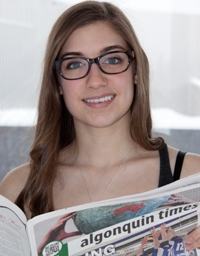Algonquin Offers a Hands-On Education For Real-World Jobs
 You’re attending college and looking ahead to graduation. It’s a crowded workplace and you know the importance of gaining a competitive edge. And among the greatest advantages is experience. But how do you get experience working in your chosen field before graduation?
You’re attending college and looking ahead to graduation. It’s a crowded workplace and you know the importance of gaining a competitive edge. And among the greatest advantages is experience. But how do you get experience working in your chosen field before graduation?
Algonquin College offers you a hands-on education for real-world jobs. We have become the largest college in eastern Ontario by providing great facilities and applicable programs led by well-connected instructors.
Let’s begin with Career Planning.The Algonquin College Employment Support Centre provides:
- Workshops on resume building, interview skills and tips
- Online job postings
- 1 on 1 counseling for employment assistance
- Resume writing tips
- Interview tips
- The hidden job market
Be sure to consider the benefits of co-op work and internship opportunities. We offer:
- Internships
- Job placements
- In-Class training
- Guest speakers
- Work projects – for real businesses
- Student-run businesses
What are students saying?
What are Algonquin students saying about a hands-on education?
Kyle Megill, an Interior Design student, notes “The program provides training through co-op placements and projects. We are given multiple projects and that allows you to use what you've learnt in various facets of design. My personal career interest is joining an architectural or industrial design firm — and the Algonquin program allows me to nurture personal interests.”
Alexandra Mcleod, currently enrolled in Applied Museum Studies, comments, “The program includes a semester-long internship and that helps students to work in a full-time museum setting. I am currently completing an internship at the National Gallery of Canada in the Collections Management Department.
The internship provides unique and relevant experience and really adds to your resume. There are opportunities to network with industry professionals that include volunteer work, special projects, professional development and conferences. The courses encompass all aspects of work in a functioning museum. It’s great."
The interviews
There’s nothing like hearing success stories directly from the participants. That’s why we leave the last words to two current Algonquin students, Hannah Monroe and Dali Carmichael.
Hannah Monroe – Bachelor of Applied Arts – Interior Design
Q: What type of career training do you get in your program?
A: We have a mandatory three-month co-op period that occurs between the third and fourth year of study. You may get placed in design or architecture firms. In the program we have mandatory volunteer hours – some in the field and some in the program. We use those hours with these firms – and develop practice work.
Q: Have you done co-op?
A: Yes, I worked with the Privy Council on Parliament Hill. It was an excellent experience. A lot of what we learn, we learn in the field. The students in this program mainly work in the Ottawa area.
Q: Do you feel you are being prepared for the career you want?
A: Yes. 100%. They have really good hands-on training in the program. You learn a lot about what you’re going to face in the field – especially with co-op. It helps you get a job.
Q: Is there any other hands-on training you do that will be useful in your career?
A: All the skills that we learn in the four years of the program are applicable to a job. We cover everything from AutoCAD to Adobe Master Suites. We do work on developing prospectus – so we have experience conveying ideas quickly. It’s a great program.
Dali Carmichael – Journalism Student
Q: What type of career training do you get in your program?
A: I’m in the journalism program and I’m the senior editor of the school’s newspaper – so I’m kind of more hands-on than most people in the program. I do my own interviewing and I learned photography. So there’s that aspect of going out and actually doing it. I came from the University of Ottawa. They offer a program jointly with Algonquin. So previous to Algonquin, I was learning about communications theory. The Algonquin portion has been the hands-on experience. So there’s the reporting aspect. In addition, as a senior editor, I check all the layouts. I have to approve everything – and check the headlines. I’m part of the copy editing process. We really get into all aspects of print journalism.
Q: Do you feel you are being prepared for the career you want?
A: For my industry, specifically, a lot of news outlets complain that you have someone who is knowledgeable but they can’t hit the job running. With the Algonquin program, you’ve already done a lot of interviews, you know how to lay out pages, and they know that when they hire you, they don’t have to do a lot of training to do.
Subscribe to our newsletter